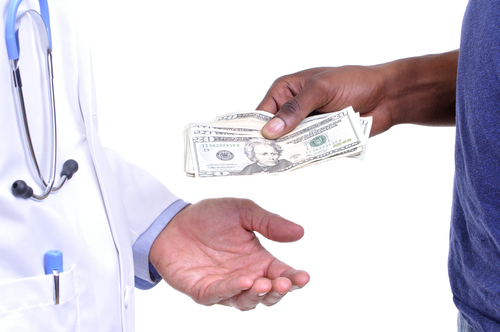- Patients Not Paying Copays Due
- What Happens If You Can't Pay A Copay
- Patient Copay Assistance Programs
- Patients Not Paying Copays Insurance
- For example, if a patient has a 10 percent co-pay, the insurance company pays $90 on a $100 bill. But if the health care provider waives the copay, the patient's bill is only $90 total, not $100. Financial Hardship. If a patient suffers financial hardship, physicians may choose not to collect debts from them without risking allegations of.
- A few weeks after the new policy has gone into effect, Dr. Mizrahi is happy to see that most patients have been able to afford the small copays required for clinic visits, as both new and established patients have continued to come to the clinic. In the middle of a busy Monday morning, Dr. Mizrahi pauses to read her next patient's chart.
- Because Medicaid covers particularly low-income and often very sick patients, services cannot be withheld for failure to pay, but enrollees may be held liable for unpaid copayments. States have the option to establish alternative out of pocket costs.
- Most patients now deal with health insurance that features either a high deductible or coinsurance – or a combination of both. Deductibles and coinsurance do not negate monthly premiums, though; they are paid on top of them. Deductibles – A deductible is the amount of money a patient must pay out-of-pocket before their insurance pays.

'Yet another area where docs are caught in between the devil and the deep blue sea. Not collecting [a copay] upfront and seeing the patient is actually considered Medicare fraud… [but] ethically and medico-legally you are obligated to provide continuity of care for a patient.' – Urology
Regardless of what insurance a patient has, almost everyone in the United States makes a copay when going to a doctor – but what are doctors to do when a patient cannot afford their copay?
Patients Not Paying Copays Due
A doctor from the US specializing in Ophthalmology and Genetics recently asked his fellow physicians on Sermo if they had ever encountered a patient who cannot pay the copay:
What Happens If You Can't Pay A Copay
If a new patient doesn't want to pay the co-pay, [that] is an easy decision. The patient is not seen.
[But] what if the patient pays the co-pay for the first visit but needs important follow-up and says they have no money for the co-pay until payday? If patients don't pay the co-pay at the time of the visit, there is a big chance that they will never pay or take up a lot of staff time to collect later.
The follow-up is important enough that rescheduling the patient until after payday is risky from a malpractice standpoint.
Listen to Hallelujah by Origin on Deezer. With music streaming on Deezer you can discover more than 73 million tracks, create your own playlists, and share your favorite tracks with your friends. Deezer origin.
Patient Copay Assistance Programs
Doctors are struggling to keep their practices afloat, and failure to pay is a serious issue, but at the end of the day physicians are there to practice medicine, support their patients, and put patients first. In response to the question above, many doctors asserted that the posting doctor should see that patient that can't pay as an exception and just hope the patient pays the copay later:
Patients Not Paying Copays Insurance
'It can be very frustrating at times. No checks, no cash, no credit cards to pay co-pay. However, if they're sick, you have no choice.' – Pediatrics
Medication and treatment should be a relief, not a burden. Patient Advocate Foundation's Co-Pay Relief program exists to help reduce the financial distress patients, and their families face when paying for treatment. We believe that no patient should go without life changing medications because they cannot afford them. We are here to help.
'You just have to hope that most patients pay. Let staff do the best collections they can. Ophthalmology is a high pay specialty; you will eke out a living somehow.'- Family Medicine
'I am assuming you are concerned the patient legitimately cannot pay. Do what is right for the patient's health, but you can't always tell who can't pay.' – Anesthesiology
Capture one 20 mac os. 'I appreciate the patients who at least apologize and promise to pay when they can. I never turn anyone away who seems legit.' – Ophthalmology
'If the patient is legitimate and unable to pay I usually cut them some slack.' – General Practice
'If it's urgent/emergent, you have no choice but to see patient as you've established a patient-doctor relationship. You will be at risk of being blamed for abandonment if u refused to see patient.' – Anesthesiology
'If the patient's condition really is serious enough to warrant a worry about malpractice, I'd see them. You might be pleasantly surprised, and they pay after payday. If not, it will probably be worth seeing them for free so as not to worry about the patient, or a malpractice lawsuit.' – Emergency Medicine
Are you a doctor? Join Sermo to contribute to the conversation on the business and practice of medicine!

